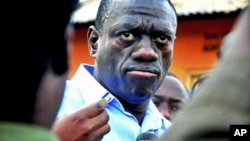The Ugandan Government has dropped charges against opposition leader Kizza Besigye for his role in the April "Walk to Work" protests. But it appears the demonstrations, which provoked international cries for democracy, may have had the opposite effect.
On Wednesday, the Ugandan government formally withdrew charges against three-time presidential candidate and opposition figure Besigye for incitement of violence during the "Walk to Work” protests.
In April, Besigye, along with members of Uganda’s opposition parties staged bi-weekly marches to protest the rising cost of food and fuel in the east African nation. Besigye was arrested multiple times, receiving numerous injuries at the hands of police, and was at one stage being forced to fly to Nairobi for treatment. Protesters were confronted by units of Uganda’s police force, leaving nine dead and hundreds more injured.
As the international community took notice of the protests, “Walk to Work” became as much a protest of Uganda’s flagging economy as a referendum on the long rule of President Yoweri Museveni. Once hailed as an anchor of stability in an unstable region, Museveni received harsh criticism and calls for an end to his quarter-century rule.
With Besigye’s charges being quietly dropped Wednesday, however, it appears the restrictions on free speech and public assembly employed by Museveni to quell the protests are more entrenched than before.
Godfrey Odongo, a researcher for Amnesty International in Uganda, said, “The President has come up with a series of public statements that seems to suggest that the official policy from the highest office in the land is still that the government will be intolerant to any form of civil dissent, whether that involves peaceful or not.”
In response to the initial protests, the Ugandan Police instituted a blanket ban on all public demonstrations, a ban which activists say still exists today.
Earlier this week, a small group of protesters who gathered to question Museveni’s eligibility for office were met by around 200 armed riot police in Kampala. Last week, armed members of Uganda’s military and police patrolled the streets of Kampala in response to a strike by shopkeepers over rising prices.
According to Kampala residents, Constitutional Square - normally a focal point for public dissent - is being heavily policed more than two months after the last 'Walk to Work' demonstrations.
But Kampala Metropolitan Police Spokesperson Idi Ssenkumbi said the Ugandan police have the right under the Police Act to regulate protests and assemblies. While he acknowledged the increased police presence in Constitutional Square, Ssenkumbi says that any protests against Museveni would be allowed, so long as they did not pose a security risk.
“We actually don’t, so much, look into the purpose for the protest, we look into the security issues around it," said Ssenkumbi. "That is our major concern.”
The police spokesperson also denied that a ban on protests had been issued, pointing to recent protests in Kampala against Libyan leader Moammar Gadhafi.
"Walk to Work" - which began with a few politicians simply walking through the streets of Kampala - gradually grew into a nationwide demonstration. Over the course of the month, Ugandans from around the country joined in, attracted perhaps as much by the message as by the crushing government response to the movement.
Around the world, observers likened the burgeoning movement to the protests occurring throughout the Arab world, with some predicting a change of guard in Uganda. But as the protests reached their peak, they unexpectedly fizzled out. After the return of Besigye from Nairobi, mass demonstrations all but ceased.
According to Professor Frederick Golooba-Mutebi of Uganda’s Makarere University, the opposition found itself with no newfound political power, while Museveni remained as strong as ever.
“President Museveni still has the power that he always had," said Mutebi. "President Museveni’s key constituency is not the Ugandan public. It is the military and the security establishment. As long as those still hold firm in his camp, he still remains strong and powerful and able to hold on.”
And though it seems not much has changed politically as a result of the protests, the government’s heavy handed treatment may have damaged the president’s legacy among his own people.
Museveni once was viewed by many as a champion of democracy, having been involved in the armed struggles to overthrow corrupt and autocratic Ugandan Presidents Idi Amin and Milton Obote. But his suppression of the peaceful "Walk to Work" protests has alienated many of his former supporters. Beyond that, it appears the actions of the Ugandan government have awakened a new political spirit in Uganda.
“Since the "Walk to Work" campaign, we have seen a strike by Kampala traders, we have seen a strike by minibus drivers and conductors, and now we hear rumors of an impending teachers’ strike," said Mutebi. "Really the mood for protest is growing.”
With Uganda’s economic situation deteriorating over the past months, observers expect increasing discontent among average Ugandans. The discontent has been exacerbated by Museveni’s firm rejection of any claims of economic crisis. According to Mutebi, the president may be faced with more mass actions, even as he tries to instill calm.
Mixed Legacy for Uganda’s 'Walk to Work' Protests




